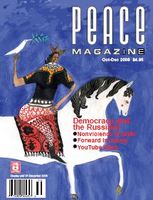
Peace Magazine Oct-Dec 2008, page 6. Some rights reserved.
Search for other articles by Metta Spencer here
This spring I spent two months traveling in Europe, including five weeks in Moscow, where I interviewed 35 politicians and activists. Eleven years had passed since my last visit, and the changes in Moscow were remarkable. The city looks as much like Las Vegas as the old capital of Communism. Some of my discoveries were troubling. For example, I didn't find a single person who knew much about climate change or considered it a serious problem. You cannot buy Al Gore's movie An Inconvenient Truth there, for reasons probably related to Russia's new wealth from oil and gas.
Moreover, it was disconcerting to chat with some of my old friends who used to believe in nonviolent resistance. They have largely reverted to Marxism and reveal Hegelian assumptions about social change.Even the ones who dislike Putin now regard the "color revolutions" as instances of mob rule rather than as liberation. They especially loathe Georgia's Saakashvili and one even called me as a tool of American imperialism for supporting Aung San Suu Kyi or the Dalai Lama. Their hostility is not merely anti-Americanism, for they resent Britain even more for trying to extradite a Russian man charged with poisoningAlexander Litvinenko with polonium.
In this new era, moneyed Russians can travel abroad, so it is no longer thrilling, say, to attend a Pugwash meeting in Europe. But genuine dialogue has declined between Western peaceniks and the Russian intelligentsia and needs to be revived. Fortunately, I found it possible to reduce the misunderstandings between us by talking a few hours with each person, making it clear that I too oppose recognizing the independence of Kosovo, the expansion of NATO to their borders, and the installation of missile defences in Poland and Czechia. These three policies (which I deplore), plus the nonviolent revolutions in Serbia, Georgia, and Ukraine (which I celebrate) are the main slights that Russians resent. I was not surprised when, a few weeks later, Putin won praise by invading South Ossetia. Russians (correctly, Ithink) see its recognition, and that of Abkhasia, as completely parallel to that of Kosovo. Feeling betrayed by the West, they retaliated by recognizing the self-determination of those two regions.
While most endorse this action, nobody in Moscow seems to call the current regime a democracy -- nor do many of them wish it were. They believed Yeltsin's claims to be a democrat, and having experienced his chaotic presidency, few of them want any more democracy.
But some Russians do understand democracy and want it for their country. I will present here portions of my interviews with two of them, Ludmilla Alexeeva and Grigory Yavlinsky.
Alexeeva is a remarkable elderly lady now, universally respected as a former dissident who founded the Moscow Helsinki Group. She still is influential. A few weeks ago, for example, she invited the leaders of democratic organizations to a tea party and urged them to cooperate more.(Good luck!)
For his part, Yavlinsky gained world-wide fame under Gorbachev, who put him in charge of a group of economists. They came up with the "Five Hundred Day Plan," which never was implemented, mainly because the Soviet Union came apart. Yavlinsky founded a liberal party called Yabloko and ran twice for the presidency of Russia, coming in third each time.
But Yabloko has lost most of its support now, for Putin does not permit critics and opposition parties to air their views in the press or television. I interviewed Yavlinsky in the Yabloko office, but within a month he resigned as its leader.

Peace Magazine Oct-Dec 2008, page 6. Some rights reserved.
Search for other articles by Metta Spencer here